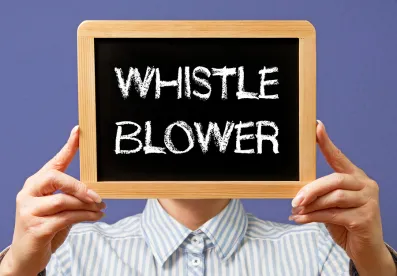After two years of debates, the U.S. Securities and Exchange Commission will finally meet and vote on new rules governing its highly successful whistleblower reward program. The public meeting and formal vote on the proposed whistleblower rules are set for September 2, 2020.
The new rules were highly controversial from the start. The Commission voted 3-2, along “party” lines, to even release the proposed new rules, many of which were viewed as potentially weakening Dodd-Frank Act whistleblower protections. Thereafter, a lively public debate ensued. Based on the record-setting number of comments flooding into the Commission and grave public concerns over some of the proposals’ negative impact, the Commission canceled its first scheduled vote on the rules (originally set for October 2019). Instead, the Chairman of the Commission, individual Commissioners, representatives from the Office of General Counsel and the Office of the Whistleblower, agreed to meet with representatives from firms with expertise in whistleblowing, and consider additional information concerning the potential negative impact of the proposed rules.
In fact, the debate drew over 110,000 comments in opposition to key proposals presented by the Commission, with less than ten comments in support of the most controversial proposed changes. Opposition came from major whistleblower and investor advocacy groups such as the National Whistleblower Center, Public Citizen, Taxpayers Against Fraud, and Better Markets. Nationally recognized whistleblowers, such as Sherron Watkins, Frederic Whitehurst, and Harry Markopolos, also weighed in against the key proposals. The than-Chairman of the Senate Judiciary Committee, and the leading Congressional expert on whistleblower laws, Senator Charles Grassley, joined in the opposition.
The main proponent of the controversial proposals is the Chamber of Commerce, which has a long record of opposing every law, rule, or judicial precedent that helps whistleblowers. The Chamber’s most recent success was the Digital Reality decision, which stripped whistleblowers who raised internal concerns within their companies (such Audit Committees, supervisors, General Counsels etc.) of any employment protections under the Dodd-Frank Act.
The impact the new SEC rules will potentially have on the Dodd-Frank Act whistleblower law cannot be underestimated. At issue is the continuing effectiveness of one of the most well-respected whistleblower programs in the United States. As the SEC has itself explained since the current rules were implemented in 2011, the Commission has already collected over $2.5 billion in sanctions from whistleblower cases, provided over $750 million in restitution to harmed investors, and compensated whistleblowers with over $500 million in rewards. All of this progress is on-the-line.
What’s At Issue
The SEC proposed six major rules changes. They are briefly described below.
Change to Rule 21F-2(d) (Internal Whistleblower Protection): Under the current rules, the SEC has the authority to sanction regulated companies that retaliate against internal whistleblowers who participate in internal corporate compliance programs or raise concerns to their supervisors. The proposed rule takes away this authority and strips the SEC of the ability to sanction companies that retaliate against employees who raise concerns to corporate compliance programs, supervisors, General Counsels, directors, etc. However, as fully explained in detailed rulemaking comments filed with the SEC, the Commission has the legal authority to continue policing corporate misconduct related to internal corporate whistleblowers. This authority was even acknowledged in a letter to the Commission filed by Senators Grassley and Patrick Leahy shortly after the Sarbanes-Oxley Act was passed. The Chamber of Commerce supported this change. Whistleblower attorneys opposed it. Because the vast majority of corporate whistleblowers utilize internal reporting channels, the SEC’s final decision on this issue will have major national and international impact.
Change to Rule 21F-3 (New limits on “related action” payments). This proposed rule addresses the issue when two separate laws could pay a reward based on the same underlying violations. The Commission’s intent to create rules addressing this issue was generally non-controversial, however, the manner in which this issue is addressed could have significant impact on whistleblowers.
Change to Rule 12F-6(c) (awards in small cases). A larger number of the award decisions issued by the SEC are very small. It is not uncommon for the SEC to issue awards in the hundred-thousand-dollar range. This proposed change would permit the SEC to increase the percentage of an award in small cases. Because the size of an award plays a significant role in incentivizing whistleblowers to step forward and risk their careers, the Commission’s proposal on this issue was supported by whistleblower advocates.
Change to Rule 21F-6(d) (reduction of rewards in large cases): This rule change sparked significant opposition from whistleblowers, Senator Grassley, and investor/whistleblower advocacy groups. The proposed rule would establish a “soft cap,” in which the percentage of an award would be presumptively reduced to the lowest possible percentage level in cases in which a whistleblower’s original information resulted in the Commission obtaining sanctions of $300 million or more. In other words, whistleblower rewards would be reduced in the largest cases, in which the whistleblower’s information identified the biggest crimes harming the most investors. Opponents of this change strongly argued that any rule authorizing the Commission to reduce awards based solely on the size of a sanction obtained would harm the program and provide a disincentive for whistleblowers.
Opponents of the rule pointed out that often the source of information regarding the largest frauds comes from highly placed, and well-compensated executives. These employees have the most to lose if they are ever identified as the “whistleblower,” and thus need significant incentives to take the risks involved in whistleblowing. The opponents of the change explained that if this soft cap were approved, the SEC would lose access to whistleblower information that, in many cases, could result in preventing or successfully prosecuting the largest frauds.
Additionally, opponents explained that large awards have a major deterrent effect and prevent future criminal activity.
The Chamber of Commerce supported the change, primarily relying on its argument that large awards could impact corporate internal compliance programs. That argument was odd, as the Chamber of Commerce had argued before the U.S. Supreme Court in the Digital case that the Dodd-Frank Act provided no support whatsoever for internal whistleblowers, and employees who reported these concerns to internal compliance programs could be fired at-will, with no recourse to the Dodd-Frank Act’s strong anti-retaliation laws. The Chamber did not explain how permitting internal whistleblowers to be fired would not have a chilling effect on internal compliance programs, while paying large rewards would.
Change to Rule 21F-8(e) and new Rule 21F-18 (preventing meritless claims): These two rule changes were generally supported by all sides. They were designed to prevent frivolous claims, and permit the SEC to summarily dismiss such cases, and bar claimants who file numerous frivolous claims from participating in the program. The proposed changes were generally not controversial.
Change to Rule 21F-9(e) (Definition of an eligible whistleblower): This rule change was the least understood, but the most devastating anti-whistleblower proposal. It made what was initially viewed as a minor change. Whistleblowers would be required to first file their concerns on the SEC Form TCR in order to be eligible for a reward. The key change here was the inclusion of the term “first.” Under the current rules, whistleblowers have to file their award claims on a Form TCR. However, there no strict timing requirement for filing the Form. Thus, if a whistleblower sent a letter to the Chairman of the Commission outlining a major fraud, and later filed the official Form TCR, under the proposed rules that whistleblower would be disqualified from obtaining a reward, because his or her “first” disclosure was not on the Form TCR.
Both the Commodity Futures Trading Commission and the IRS rejected similar approaches under their programs.
Additionally, the Commission proposed strict rules to enforce this new rule. If information were initially provided to any part of the entire SEC outside of a Form TCR, that whistleblower would be automatically disqualified from a reward, regardless of the level of cooperation provided to the Commission by the whistleblower, the quality of the information provided by the whistleblower and the role the whistleblower played in preventing major frauds. Under the proposal, the ability to appeal such a denial would be extremely limited. First, a TCR would need to be filed within 30-days of an initial contact with the SEC. Thus, if a whistleblower wrote a letter to the Chairman of the Commission exposing major frauds, if that whistleblower did not figure out that he or she needed to file the official TCR form quickly, he or he would be forever barred from a reward.
If the whistleblower who wrote the letter to the Chairman figured out that he or she needed to quickly file the TCR form, and met the 30-day deadline, he or she is still presumptively disqualified from a reward and forever disqualified from the mandatory minimum 10% award. If the whistleblower can meet a very high burden of proof, the whistleblower who filed the TCR form with the 30-day time period could ask the SEC to give an award. Any such award would be provided completely within the discretion of the Commission and would be unreviewable in court. Thus, the Commission would have the complete authority to reject the award or set it far below the minimum thresholds required by Congress, and that decision would not be subject to review.
Because large numbers of whistleblowers initially have more informal contacts with the Commission prior to submitting a formal TCR complaint, the potentially devastating impact of this rule change cannot be underestimated. It would result in the presumptive (and in most cases the permanent) disqualification of numerous otherwise fully qualified whistleblowers who failed to “first” report frauds through the official TCR process.
As pointed out in letters of opposition to this proposal, on the SEC’s website, there are numerous forms and email addresses that encourage citizens/whistleblowers to report frauds outside the official TCR process, including the investor complaint form. Moreover, the proposed rule would disqualify persons who initially contact the Office of Enforcement, the Office of General Counsel, the Inspector General, and even the Office of the Whistleblower, if they do not use the official Form TCR to first raise their concern.
If the SEC commenced denying rewards to otherwise qualified whistleblowers, the overall impact on the program would be catastrophic. It would discourage whistleblowers from filing, create massive distrust of the SEC, and undermine the deterrent effects of the law.
Whistleblower lawyers and advocates opposed this rule change. The Chamber of Commerce supported the change.
Taken together, the proposed rule changes could radically alter the entire SEC whistleblower program and create major disincentives and roadblocks to whistleblowers ever obtaining a reward. The real losers would be the harmed investors. If the proposed rules are enacted in their current form the only winners will be fraudsters on Wall Street.




 />i
/>i

